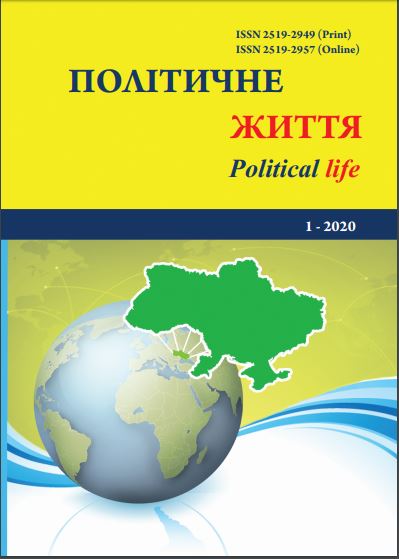Modernization of the policy of the international organizations in information security.
DOI:
https://doi.org/10.31558/2519-2949.2020.1.15Keywords:
international organizations, information security, cybersecurity, information threats, centers of counteraction, UN, NATO, OSCE, BRICSAbstract
The article analyses the modernization of international organizations' policy in information security in view of the emergence of new hybrid threats for international peace because global security issues occupy a special place in the structure of international policy, identify the contradictions of the current stage of international development and reached such a level and severity that can endanger the maintenance of world order, even the existence of civilization. Nowadays, the issue of information security at the international level consists in the striving some global actors to control political processes in large territories with using information and cyber operations that cause the problem of information imbalance of forces and violation of national information sovereignty. The analysis of the strategies of international cooperation in information security shows common and different approaches to the transformation of political activities of international organizations that depends on the political positions of the actors, different priorities of providing information security and different level of their information development.
The practical provision of information security in the format of international organizations has been determined by the strategic focus of threats on the critical life systems of the world community, the use of information resources as a weapon of mass destruction, the need to create international mechanisms of counteraction and prevent global confrontation, unforeseen in its consequences. Trends of global and regional issues have influenced on the ability of international actors to determine the directions and strategies of political changes in the future, as well as led to the involvement of a powerful mechanism of international institutions for solving the problems of world development. The hybrid nature of information threats has led to a transformation of the international organizations' approaches to information security and the establishment of new structures for countering modern challenges to maintain peace and stability.
References
Libicki M.С. Conquest in Cyberspace: National Security and Information Warfare / M.С.Libicki. – Cambridge: Cambridge University Press, 2007. – 336 p.
Hoffman F. Hybrid vs Compound /Frank G. Hoffman // Small Wars Journal. – 2009. – October.
URL.: http://smallwarsjournal.com /blog/journal/docs–temp/189–hoffman.pdf.
Nye J.S. Cyber Power / Joseph S. Nye. – Cambridge: Pub. by Belfer Center for Science and International Affairs, 2010. – 26 p.
Cebrovski A., Garstka J. Network–Centric Warfare: Its Origin and Future / A. Cebrovski, J.Garstka
// Proceedings. – 1998. – January. URL.: http:// www. kinection. com/ ncoic/ ncw _origin_future.pdf
Міжнародна інформаційна безпека: теорія і практика//Макаренко Є.А., Рижков М.М., Ожеван М.А., Кучмій О.П., Фролова О.М./Підручник. – Київ: Центр вільної преси, 2016. – 418 с.
Почепцов Г. Гибридная война: информационная составляющая / Г.Почепцов.
URL.: http://psyfactor.org/ psyops/hybridwar5.htm
Ожеван М.А.Глобальна війна гранд-наративів у сучасну добу // Стратегічні комунікації в міжнародних відносинах. Монографія. – К. : Вадекс, 2019. – 442 с.
Report of the Group of Governmental Experts on Developments in the Field of Information and Telecommunications in the Context of International Security. URL: https://documents-dds-ny.un.org/doc/UNDOC/ GEN/ N13/371/66/ PDF/N1337166. pdf?OpenElement
Resolution adopted by the General Assembly on 12 December 2019 [on the report of the First Committee (A/74/363)] 74/29. Developments in the field of information and telecommunications in the context of international security. URL: https://undocs.org/en/A/RES/74/29
Developments in the field of information and telecommunications in the context of international security. URL: https://www.un.org/disarmament/ict-security/Prevention of an arms race in outer space https://undocs.org/en/A/RES/74/32
NATO Cooperative Cyber Defence Centre (CCDCOE). URL: https://www.cybersecurityintelligence.com/ nato-cooperative-cyber-defence-centre-ccdcoe-395.html
Tallinn Manual 2.0 on the International Law Applicable to Cyber Operations to Be Launched
// NATOCCDCOE. – 2017. URL: https://ccdcoe.org/tallinn-manual-20-international-law-applicable-cyber-operations-be-launched.html.
A cyber-security framework fordevelopment, defense and innovation at NATO.
URL: https://innovation-entrepreneurship.springeropen.com/track/pdf/10.1186/s13731-019-0105-z
Brent L. NATO’s role in cyberspace. URL: https://www. nato.int/docu/ review/articles/2019/02/12/
natos-role-in-cyberspace/index.html
Organization for Security and Co-operation in Europe – OSCE. URL: https://www.osce.org/whatistheosce
Austrian OSCE Chairmanship Conference on Cyber Security. URL: https://www.osce.org/event/austrian-cyber-security-2017
Cyber/ICT Security for a safer future: The OSCE’s role in fostering regional cyber stability.
URL: https://polis.Osce.org/cyberict-security-safer-future-osces-role-fostering-regional-cyber-stability
Belli L. BRICS countries to build digital sovereignty. URL: https://www.opendemocracy.net/en/hri-2/
brics-countries-build-digital-sovereignty/
From BRICS to CyberBRICS: New Cybersecurity Cooperation. URL: http://www.chinatoday.com.cn/ ctenglish/2018/tpxw/201911/t20191113_800184922.html

